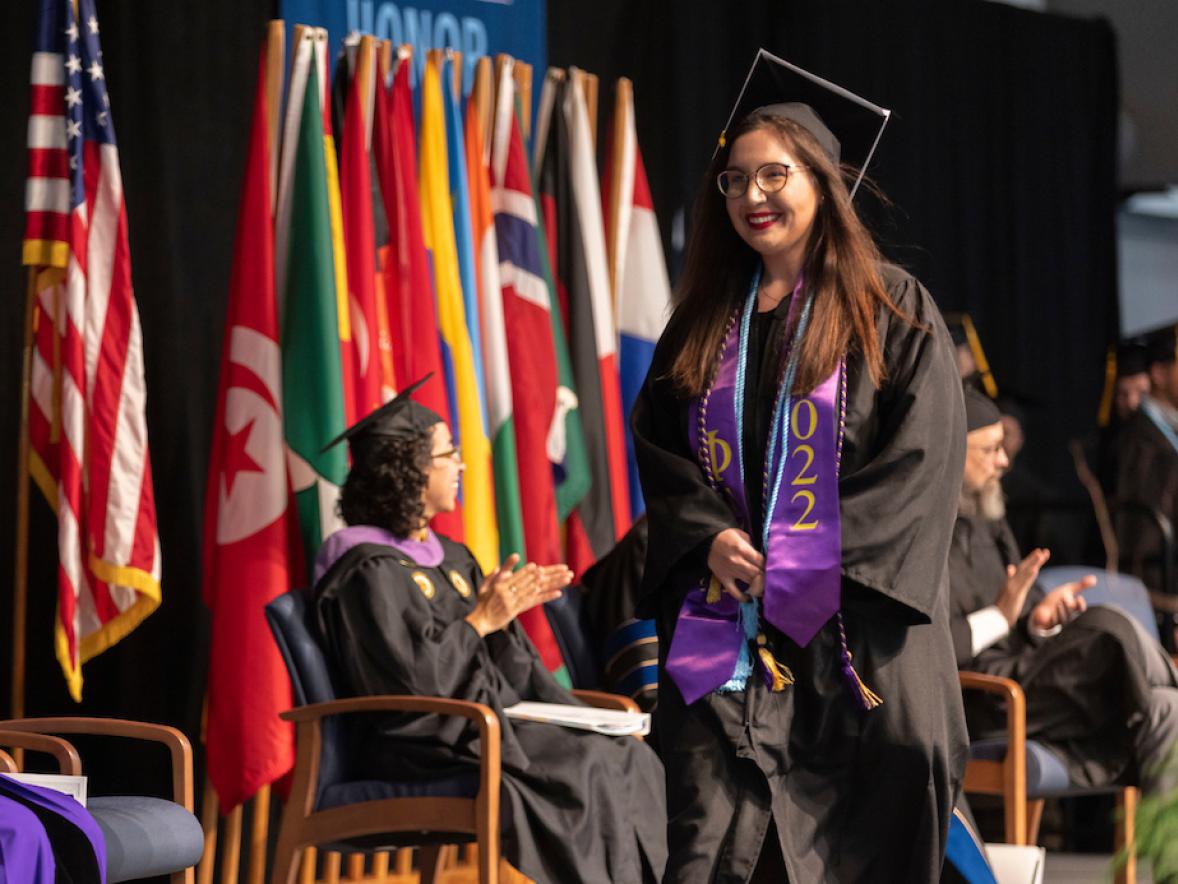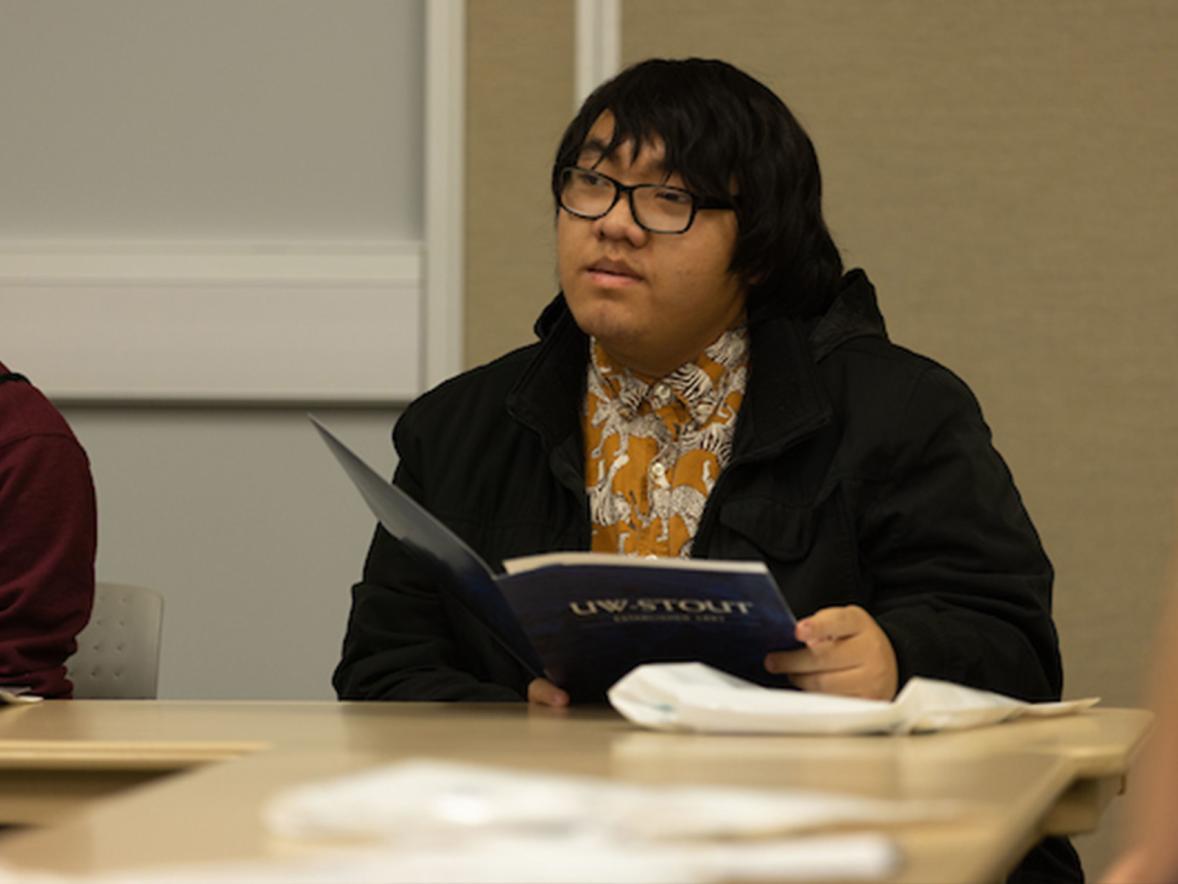Make a Difference. Teach Special Education.
UW-Stout's Bachelor of Science in Special Education program prepares future teachers for a cross-categorical license to teach elementary, middle, and high school students with disabilities in the areas of learning, intellectual, emotional, and behavioral disabilities. Our Special Education on-campus degree completion program is designed for traditional first-year and transfer students.
100% of Graduates Are Employed or Continuing Education.
Career-Defining Curriculum
Your mission is to advocate for your students and their families while providing an appropriate level education for each student’s ability. To succeed, you’ll need to know how to assess the characteristics of the learners you serve, design effective teaching strategies, and develop the right attitude to practice within established standards. Our program graduates enjoy meaningful careers making a difference in the lives of children with disabilities special education teachers. As a graduate, you’ll be eligible to receive a Wisconsin teaching license in cross-categorical special education.
Program Highlights
- Personal faculty support and advisement
- Early and varied field placements
- Cross-categorical licensure
- Instruct kindergarten through adolescence, including ages 5-21
You’ll work with general education teachers to:
- Develop lesson plans, materials, tests and access student learning
- Adapt curriculum to be appropriate for each student
- Teach specific learning strategies and study skills
The special education teacher responsibilities also include:
- Assessment
- Developing individual education and transition plans
- Working with families and other support services
Increasingly, students with disabilities have been integrated into general education settings. Their education is usually supplemented by support services provided by a case manager. As a special education teacher, you must possess a working knowledge of all general education curriculum subjects and content.
Stackable Certificates & Certifications to Enhance Your Degree
Post-Baccalaureate Educator Certifications
Continue Reading"Stout's Polytechnic approach provides small class sizes that allowed me to form connections with classmates and professors. The classes were never just lectures every day. There was always an activity or hands-on experience. I had experiences learning abroad, teaching in a classroom, working in labs, and doing research. This helped me be ready for graduate school."
~ Alexandra JaenkeB.S. Special Education
Use the Request Information form to receive a program summary and learn more.
Request Information
New First-Year Students
- There are no additional requirements for new first-year students.
Transfer Students
- Earn a cumulative GPA of 2.75 or higher from the last institution attended.
Students who meet this requirement will be admitted to the university in their chosen Education major. Subsequent acceptance into a teacher education major and enrollment in professional education coursework will require successful completion of Benchmark I requirements. Additional information can be found at the School of Education website.
Students whose cumulative GPA is lower than the 2.75 will be reviewed and considered on a case-by-case basis for admission consideration.
Application
To apply for the on-campus or online Bachelor of Science degree in Special Education, you need to apply to UW-Stout.
Financial Aid
Students who are attending another institution, but are planning to receive their degree from UW-Stout, may be eligible to receive aid from UW‐Stout. In these cases, UW‐Stout is considered the Home Institution and the other campus is considered the Visiting Institution.
Transfer Students
Note: When filling out the application form, be sure to make a note in the student comment section that you intend to apply to the "online program."
A college preparatory background is recommended if you are interested in the special education program. English, science, mathematics, social studies, art and music are important as these areas are all included in teaching children and young adults.
Starting Out
Your coursework is arranged so that special education courses can be taken at the same time as general education requirements. General education courses include English composition, speech, psychology, history, biology and math. Faculty members are highly qualified and eager to help you with course and career choices. Help also is available through the Advisement and Career Centers, the Counseling Center and Career Services.
As You Progress
The curriculum includes courses in:
- Educational psychology
- Multiculturalism
- Classroom management
- Vocational evaluation
- Behavioral intervention in schools
- School, family and community collaboration
You’ll also develop techniques used to teach across categories of disabilities, including cognitive, emotional, behavioral and learning disabilities. Completing a variety of field experiences – from your sophomore year through to a full semester of student teaching – will give you the experience you need to succeed. Special education faculty and students also regularly engage in outreach service and collaboration within the region and state.
According to the 2014–15 Department of Labor Occupational Outlook Handbook, "Employment of special education teachers is projected to grow six percent from 2012 to 2022. … Employment growth will be driven by continued demand for special education services. Many job opportunities will stem from the need to replace teachers who leave the occupation."
With the exception of teachers who work with students with profound and multiple disabilities in self-contained classrooms, the vast majority of special education teachers now work in regular education settings with students who have learning, cognitive, and emotional/behavioral disabilities, thus the needs for cross-categorical certification.
When students with disabilities are served outside of regular education classrooms it is typically in a "resource room" where students with various disabilities are provided specialized instruction, either individually or in small groups. The teacher may spend some time with a student or small group working on such things as study skills, preparing for a test, organization and test-taking strategies, and other strategies that help them learn more effectively and efficiently.
The individual education and placement plans developed for students with special needs are increasingly driven by the student’s instructional and behavioral needs rather than by category of disability diagnosis. Similarly, special education teachers are assigned a caseload of students with special needs based on their education plans rather than disability. Cross-categorical certification allows teachers to effectively plan curriculum for and successfully teach a wide variety of students.
Advisory Committee Members
| Grant | Allen | Assistant Professor | UW-Stout |
| Sharon | Becker | BS Special Education Program Director/Assistant Professor | UW-Stout |
| Tonya | Boudreaux | Special Education Teacher | Eau Claire Area School District |
| Debbie | Brennan | Special Education-Family Engagement Coordinator | CESA #11 |
| Debra | Delyea | District Director of Special Education | CESA #10 |
| Tracy | DeRusha | School of Education Coordinator of Field Experiences | UW-Stout |
| Sharon | Fox | Special Education Teacher for Middle and High School | Spring Valley School District |
| Jackie | Giedd | Lecturer | UW-Stout |
| Nick | Grunseth | TECAP Student | |
| Karen | Idso | Associate Lecturer in SCOPE | UW-Stout |
| Heather | Klanderman | Student Status Examiner, School of Education | UW-Stout |
| Tonia | Kowieski | Menomonie Area School District | |
| Kevin | Mason | Program Director | UW-Stout |
| Becky | Marine | CI-BS Special Education Advisor and Instructor | UW-Stout |
| Christine | McMasters | Executive Director of Student Services | Chippewa Falls Area School District |
| Heather | Sand | Director of Special Education | Elmwood School District |
| Meg | Steingruebl | ||
| Rachel | Traynor | CI-BS Special Education Student | UW-Stout |
| Sue | Van Amber | Life Skills Teacher | Chippewa Falls Area School District |
| Mandy | Van Vleet | Special Education Director | Eau Claire Area School District |






